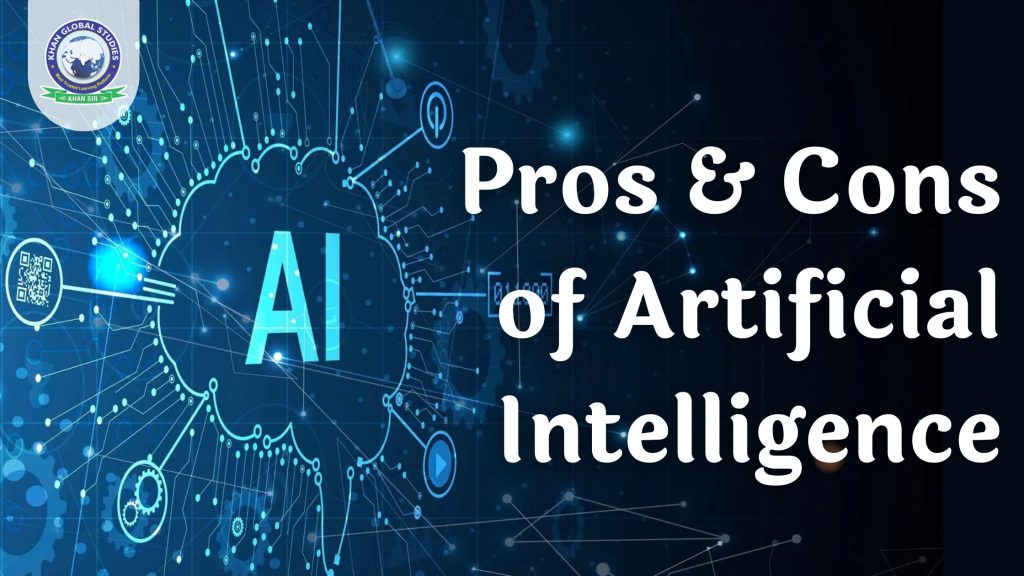Artificial Intelligence, commonly abbreviated as AI, represents an important subfield in computer science. This discipline is dedicated to creating sophisticated machines and software capable of simulating human cognition. Some AI systems have the remarkable ability to evolve autonomously by examining complex data sets, thereby increasing their performance without the need for human intervention for programmatic refinement.
In recent years, it has witnessed an unprecedented boom, becoming an integral part of both corporate operations and daily life. Individuals regularly connect with AI-powered virtual assistants or applications to simplify their lives. Enterprises leverage AI to optimize production workflows, forecast financial results, and anticipate maintenance needs.
Advantages and Disadvantages of Artificial Intelligence
The ubiquity of Artificial Intelligence has spread across many industries, providing problem-solving capabilities, learning capabilities, and valuable insights. However, the advent of AI also brings challenges such as potential job displacement and susceptibility to errors. Vigilance is essential to protect personal information when using it. While AI is an invaluable asset, judicious use is paramount. Let’s take a look at the myriad benefits and disadvantages of Artificial Intelligence.
Advantages of Artificial Intelligence
- Automation of Repetitive Tasks: Across various sectors, many tasks involve repetitive, mundane activities that do not require critical thinking. These tasks follow a certain pattern to reduce errors and boost productivity, such as sending emails and document verification. Artificial Intelligence enables the automation of these monotonous tasks, thereby increasing accuracy and efficiency across industries.
- Digital Assistants: Many organizations employ digital assistants to interact with users. AI-powered personal assistants provide the necessary assistance to facilitate user queries and interactions. Notable examples include Siri, Alexa, and Bixby.
- Mitigation of Human Error: Human error is a ubiquitous issue across all sectors. Artificial Intelligence that makes decisions based on historical data is devoid of such errors, ensuring accuracy in calculations and other factors.
- Execution of Dangerous Tasks: AI-powered robots can perform dangerous tasks, such as bomb defusing and mining, thus safeguarding human lives by performing nearly inaccessible tasks.
- Uninterrupted Availability: An important advantage of Artificial Intelligence is its ability to operate continuously. It maintains constant accuracy over long periods, while humans experience fatigue and a drop in efficiency. An example of AI’s 24/7 availability is automated chatbots that provide continuous, efficient service.
- Quick Decision Making: It excels at making quick, accurate decisions, reducing task completion time and enabling multitasking, thereby reducing the workload on existing resources.
- Advanced Healthcare: It has revolutionized healthcare through advancements in medical diagnosis, drug discovery, and personalized treatment plans. AI algorithms analyze medical data, images, and genetic information, thereby aiding in disease detection and treatment.
- Intelligent Automation and Robotics: AI contributes to the development of smart automation and robotics systems that work in conjunction with humans, increasing efficiency and productivity in sectors such as logistics, agriculture, and transportation.
- Predictive Analytics: AI algorithms analyze historical data to generate predictions and forecasts, helping businesses make evidence-based decisions critical to demand forecasting, financial analysis, and risk assessment.
- Fostering Innovation and Creativity: It enhances human creativity by generating new ideas, assisting in design processes, and enabling artists, writers, and musicians to explore new possibilities.
- Natural Language Processing: Artificial Intelligence in natural language processing (NLP) facilitates machines’ understanding and communication in human language. This technology enhances human-computer interactions through voice assistants, chatbots, and language translation.
Disadvantages of Artificial Intelligence
- Significant Cost: The development of Artificial Intelligence models and robots requires significant financial investment, including constant updates and maintenance. Companies must pay AI experts a substantial salary to build and maintain systems. According to Analytics Insights, the cost of a full custom AI solution can range from $20,000 to $1,000,000.
- Potential for Unemployment: AI’s ability to perform repetitive, non-creative tasks can lead to massive job losses. For example, AI-powered chatbots provide round-the-clock customer support, which could potentially contribute to unemployment in the future.
- Lack of Creativity: It works based on historical data, making decisions accordingly but it lacks the innate creativity of humans. Tasks that require creative thinking remain beyond the capabilities of AI.
- Promoting Human Laziness: Increasing reliance on it can make humans lazier, potentially leading to future generations becoming completely dependent on machines, and incapable of independent operation.
- Decreased Dependency and Critical Thinking: Excessive reliance on AI systems can erode human skills, knowledge, and critical thinking abilities, potentially leading to reduced human interaction.
- Data Privacy and Security Concerns: AI’s reliance on data analysis raises concerns about data privacy, as the collection, storage, and potential misuse of personal and sensitive information can lead to cyberattacks.
Diverse Applications of Artificial Intelligence
- Virtual Assistants: Leveraging natural language processing, AI empowers virtual assistants like Siri and Alexa, allowing them to execute tasks and respond to queries effectively.
- Automated Vehicles: AI is the cornerstone of self-driving cars, which facilitate real-time decision-making and navigation based on sensor data, thereby enhancing road safety and operational efficiency.
- Fraud Detection: Through pattern recognition in financial transactions, AI algorithms are adept at identifying and thwarting fraudulent activities.
- Healthcare Diagnosis: AI systems can examine medical data and imagery to aid in disease diagnosis and the creation of personalized treatment plans.
- Customer Service Chatbots: AI-powered chatbots enhance customer service by providing immediate responses to inquiries, significantly reducing response times.
- Recommender Systems: AI analyzes user behaviour and preferences to provide tailored recommendations for products, movies, music, and more.
- Image and Speech Recognition: AI technology excels at identifying objects, faces, and speech, improving security and accessibility.
- Natural Language Processing (NLP): AI systems capable of understanding and generating human language perform tasks such as translation, sentiment analysis, and content creation.
- Financial Trading: AI algorithms analyze market data to execute predictive trades, thereby increasing profitability in the financial markets.
- Cybersecurity: AI identifies and mitigates cyber threats by analyzing patterns and anomalies in network traffic and user behaviour.
- Smart Home Devices: AI powers smart home devices such as speakers and vacuum cleaners, learning user preferences to automate tasks and increase convenience.
- Manufacturing Automation: In the manufacturing industry, AI-powered robots and machines automate repetitive tasks, thereby increasing efficiency and quality.





